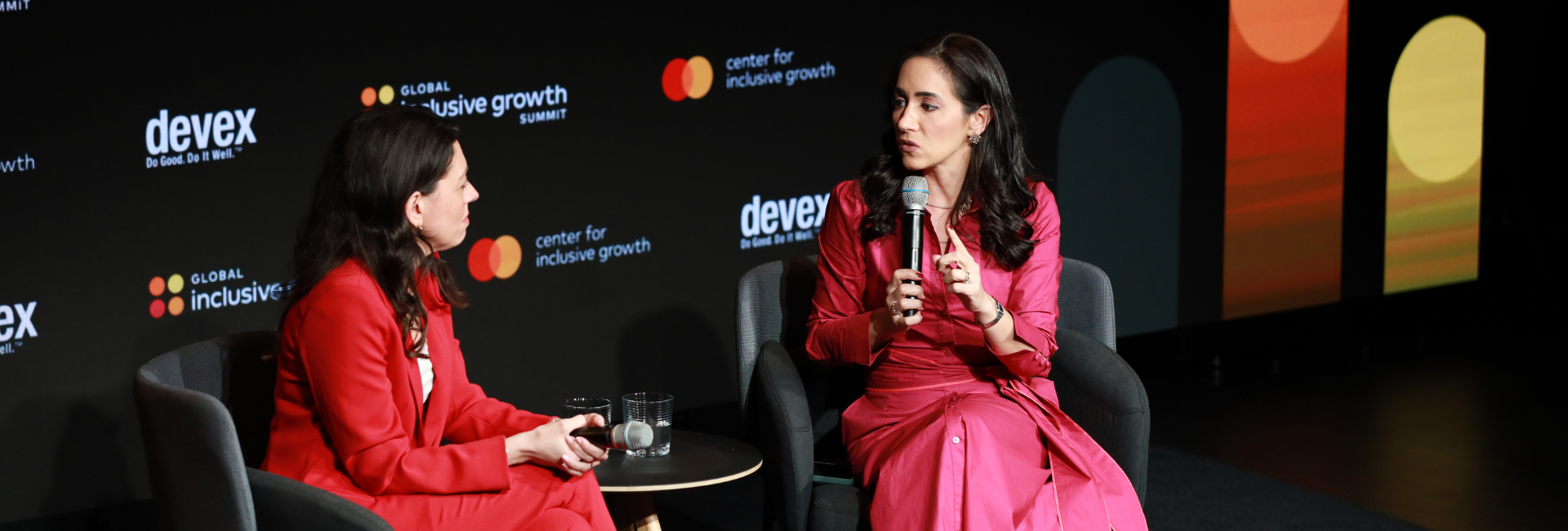12 takeaways from the Global Inclusive Growth Summit
April 25, 2024 | By Vicki Hyman
From digitization and AI to climate change and collaboration, here are a dozen insights into today’s pressing challenges and potential solutions from the world leaders, CEOs, academics, activists and others who gathered in Washington, D.C., last week for the Global Inclusive Growth Summit, hosted by the Mastercard Center for Inclusive Growth.
On technology as an equalizer — with an asterisk
“We want every single person to have access to [financial insights], no matter how much they have in their savings account, or how much credit they have. We want them to have the best possible advice and information to help them make the best decisions at any point.”
— Cristina Junqueira, the co-founder and chief growth officer of Nubank, the Brazil-based digital financial services platform, about how technology and digitization can democratize financial planning.
“Technology is an amplifier of human intent and capacity, not a substitute.”
— Manu Chopra, the co-founder and CEO of Karya, a nonprofit that employs Indian workers to train AI systems, on engaging people, particularly from low-income communities, to understand their needs and desires when developing technological solutions for them.
On opportunities for investment
“I think the biggest challenge facing the continent is that so many people unfortunately have an outdated picture of [Africa] and that it's time to change that narrative … It’s a massive talent opportunity for every single industry which is facing a shortage. But that takes an investment in education, skills and knowledge transfer.”
— Reeta Roy, the president and CEO of the Mastercard Foundation, which is focused on advancing education and financial inclusion among young people in Africa.
“What philanthropy can do is, where we have the leverage and the opportunity, to de-risk ideas and to demonstrate the viability in places where it ultimately has been hard for companies to get comfortable. Leadership is about using the capital to do more than make grants, but also to be a part of the capital stack and enable capital.”
— Marla Blow, president and COO of the Skoll Foundation
On using AI for inclusion
“The ‘eyes’ of AI have the ability to penetrate the data, to study situations in ways beyond human capability, allowing to also make connections between disparate social determinants, for instance, that impact health outcomes. Through the lens of AI, one is about to stitch together the ability to do new cures, new treatments that might not have been possible.”
— Ben Vinson III, the president of Howard University, on how AI is already having an inclusive impact on health care.
“Don’t talk about AI. Engage with AI. I think that’s really important, because AI literacy is one of the biggest gaps we are actually seeing in actually building responsible and inclusive AI systems. Everyone here should be actually testing and playing around with these AI systems.”
— Navrina Singh, the founder and CEO of Credo AI, the AI governance platform that helps businesses adopt AI fast and safely.
On the need for new approaches to climate action
“The world talks a lot about carbon neutrality, but we need to talk more about nature-positive solutions.”
— Iván Duque, the former president of Colombia.
“Indigenous peoples are already leading by example. We do not wait for anyone; we’re already protecting 80% of the world's biodiversity and we do that just as duty … We know the importance of nature, the interconnectivity between all the ecosystems, and that's where we need the collaboration, where we need to sit all together.”
— Hindou Oumarou Ibrahim, the president of the Association for Indigenous Women and Peoples of Chad.
On the power of collaboration and connection
“If you think about the great moments when America leapt forward, it always involved some form of public-private partnership. If you think about it, moonshot moments in America have resulted from academia, business and government working together. If you think, as I do, that the scourge on this country’s democracy is division, public-private partnerships bring people together, literally shoulder to shoulder.”
— Gina Raimondo, U.S. Commerce Secretary, in conversation with Jon Huntsman Jr., Mastercard vice chairman and president, Strategic Growth.
“The greatest revolutionaries, people who have moved our society, are the people who have managed to bring us together, not try to exploit our differences.”
— Ade Adepitan, Paralympic medalist and TV presenter who co-hosted the 2024 summit.
“There's always something that you can do, there's always ... an intersection of privilege where you stand where other people maybe don't, so find those places, find the something you can do.”
— Megan Rapinoe, World Cup soccer champion and social justice activist.
“The message of love and compassion is so important. Put your arms around people and show them there’s hope.”
— Music icon and AIDS crusader Elton John, in a keynote discussion with Mastercard Center for Inclusive Growth president Shamina Singh about advancing an inclusive society.
Event
Catch up with the Global Inclusive Growth Summit
The annual summit, hosted by the Mastercard Center for Inclusive Growth in Washington, D.C., last week, featured entrepreneurs, innovators, policymakers and emerging changemakers sharing insights and advancing solutions on today’s most pressing challenges.
Watch the replays here